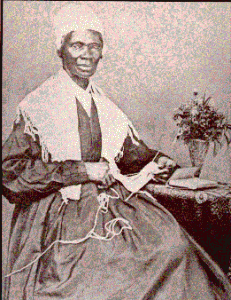
Sojourner Truth
Sojourner Truth fought for the desegregation of public transportation in Washington, DC during the Civil War. She refused to face the indignities of Jim Crow segregation on street cars and had the Jim Crow car removed from the Washington D. C. system. Sojourner Truth brought a local street to a standstill when a driver refused her passage.
With the support of the crowd she forced the driver to carry her. During her legendary life, she challenged injustice wherever she saw it. She was an ab litionist, women’s rights activist and preacher. Born into slavery (as Isabella Baumfree) in upstate New York, Sojourner Truth obtained her freedom and moved to New York City. There she began to work with organizations designed to assist women. She later became a traveling preacher and quickly developed a reputation as a powerful speaker.
A turning point in her life occurred when she visited the Northhampton Association in Massachusetts. The members of this association included many of the leading abolitionists and women’s rights activists of her time. Among these people Sojourner Truth discussed issues of the day and as a result of these discussions became one of the first people in the country to link the oppression of black slaves with the oppression of women.
As a speaker, Sojourner Truth became known for her quick wit and powerful presence. She would never be intimidated. Because of her powerful speaking ability, independent spirit and her six foot frame, she was often accused of being a man. She ended that in Silver Lake, Indiana when she exposed her breast to the audience that accused her.
Sojourner Truth lived a long and productive life. She spoke before Congress and two presidents. Sojourner Truth is best remembered for a speech she gave at a women’s rights conference where she noticed that no one was addressing the rights of Black women. Her address reads in part: “Dat man ober dar say dat womin needs to be helped over carriages, and lifted ober dicthes and to have the best place everywhere. Nobody eber helps me into carriages, or ober muddpuddles, or bigs me any best place. And ain’t I a woman? Look at me Looka at me arm. I have ploughes and planted and gathered into barns, and no mand could head me! And ain’t I a woman.”
